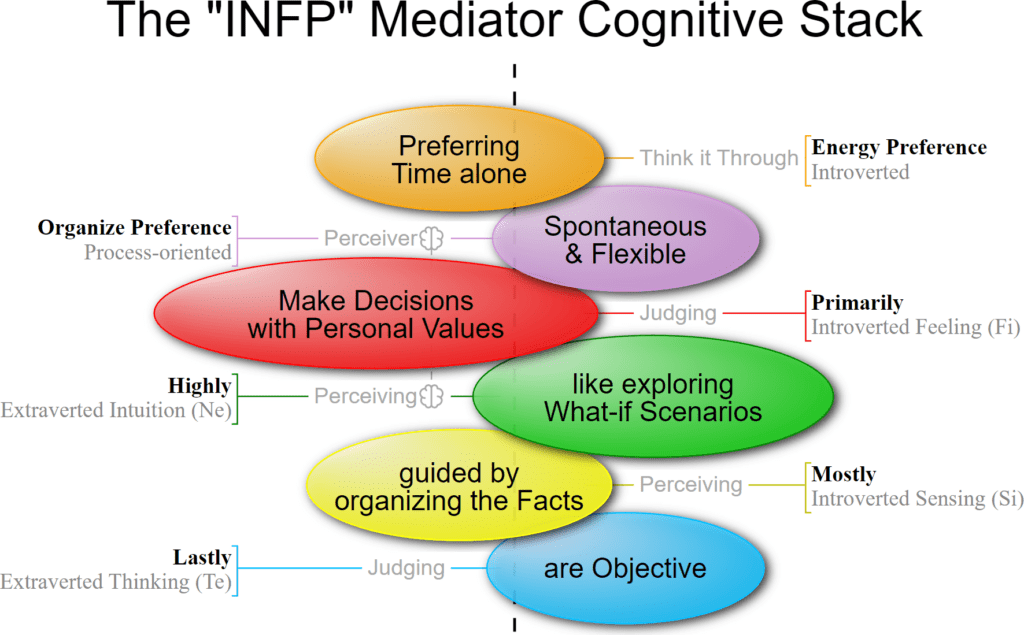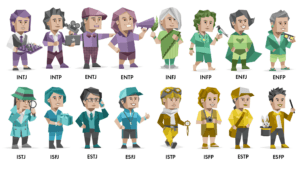The INFP Mediator Personality Type

People with INFP Personality Type are often described as romantic, creative, and values-driven.
Mediators spend a lot of time exploring their purpose in life. They are intensely interested in serving humanity and how to best help others.
With Introverted Feelings as their dominant function, Mediators use personal feelings and subjective values when making decisions.
With Extraverted Intuition as their principal extraverted function, Mediators are Perceivers looking for broad connections and patterns and are highly interested in “what-if” scenarios.

Mediators like to organize facts with their introverted sensing and use objective reasoning, with their extraverted thinking having the lowest function.
Mediators are introverted, preferring time alone to think things through. They are process-oriented, spontaneous, and flexible.
Mediators are “Abstract Perceivers” with Introverted Feelings and Extraverted Intuition. When feeling threatened, they will use logically unconnected messages through nonsequiturs in their speech and may behave with the Distractor Satir Communication Style.
INFP Personality Type cross-reference
- Keirsey Type – Healer
- Temperament Type – Phlegmatic
- Animal Type – Otter
- DISC Type – Influential
- Socio-Communicative Type – Expressive
- True Colors – Blue
- Color Code – Blue
- Personality Compass – West
- Occupational Type – Artistic
- Learning Type – Theorist
- Leadership Type – Collaborator
Enneagram Types
The Enneagram is a Personality Typing System comprising nine different types.

Dominant Function – Introverted Feeling
- They experience a great depth of feelings, but as introverts, they essentially process these emotions internally.
- They possess an incredible sense of wonder about the world and feel great compassion and empathy for others.
- While these emotions are strong, they tend not to express them outwardly, so they can sometimes be mistaken as aloof or unwelcoming.
Auxiliary Function – Extraverted Intuition
- They explore situations using imagination and ‘what if’ scenarios, often thinking through various possibilities before settling on a course of action.
- Their inner lives are a dominant force in their personalities.
- However, they engage with the outside world by using their intuition.
- They focus on the “big picture,” and things will shape the course of the future.
- This ability helps make INFPs transformative leaders excited about making positive changes in the world.
Tertiary Function – Introverted Sensing
- When taking in information, they create vivid memories of the events.
- They will often replay these events in their minds to analyze experiences in less stressful settings.
- Such memories are usually associated with strong emotions, so recalling a memory can often seem like reliving the experience.
Inferior Function – Extraverted Thinking
- This cognitive function involves organizing and making sense of the world objectively and logically.
- When faced with stress, they might suddenly become pragmatic and detail-oriented, focusing on logic rather than emotion.
- Because they are typically ruled more by intuition and emotion, they can sometimes struggle to feel productive and efficient.
- Learning to develop the extraverted thinking function can help people with this personality type create a better sense of balance.
INFP Traits
- They are reflective, creative, and romantic.
- They recognize different possibilities and long to find their meaning in life.
- They seek to find the underlying meaning of things.
- They are driven by the thought of making the world a better place.
- INFPs primary function is Introverted Feeling, in which they know what they value.
- Their auxiliary function is Extraverted Intuition, in which they can see different paths/ways of doing something.
- They tend to be introverted, quiet, and reserved.
- They can relate to others.
- They are great listeners and are always willing to help people.
- Despite being reserved, they are quite warm with people they are familiar with.
- They have to expend energy in social situations, which tends to drain their power. Hence, they prefer interacting with a select group of close friends.
- While they like to be alone, this should not necessarily be confused with shyness.
- They can be overly sensitive to criticism, even when no objection was intended.
- They may develop strong grudges towards others they think have oppressed them.
- They emphasize personal feelings, and their decisions are more influenced by these concerns rather than objective information.
- They like to keep their options open when making decisions.
- They often delay making important decisions just in case something about the situation changes.
- When decisions are made, they are usually based on personal values rather than logic.
- Almost everything experienced by the INFP contributes to their value system, which they then evaluate as crucial or trivial.
- They are generally very flexible; however, once an opinion or decision violates their values, they will aggressively defend their cause.
- They enjoy learning in environments where they can be flexible and creative.
- They may be overtly consumed with the idea that they begin to ignore anything that goes against their values.
- They may be unable to let go of a problem and become engrossed by it.
- They typically rely on intuition and focus on the big picture rather than the nitty-gritty details.
- They can be meticulous about things they care about or projects they are working on but tend to ignore mundane or boring details.
Strengths
- Loyal and devoted.
- Sensitive to feelings.
- Caring and interested in others.
- Works well alone.
- Values close relationships.
- Good at seeing “the big picture.”
Weaknesses
- They can be overly idealistic.
- They tend to take everything personally.
- Difficult to get to know.
- Sometimes, they lose sight of the little things.
- Overlooks details.
INFP Relationships
Friendships
- They typically only have a few close friendships, but these relationships are long-lasting.
- While people with this personality type are adept at understanding others’ emotions, they often struggle to share their feelings.
- Social contact can be problematic, although they crave emotional intimacy and deep relationships.
- Getting to know an INFP can take time and work, but the rewards can be great for those with patience and understanding.
Personal Relationships
- They are idealists and tend to have high expectations – including in relationships.
- They might hold an idealized image of their perfect partner, which can be a challenging role for any individual to fill.
- People with this personality type care deeply about other people.
- Yet, as introverts, they can be challenging to know.
- They tend to become very close and deeply committed to the few they forge close relationships with.
- They also dislike conflict and try to avoid it.
- When conflicts or arguments arise, people tend to focus more on how the competition makes them feel than on the exact details.
- During arguments, they might seem overly emotional or irrational.
- They can also be mediators by helping conflict members identify and express their feelings.
- Because they are so reserved and private, other people can find it challenging to get to know INFPs.
- They tend to be entirely devoted to their circle of close friends and family and place a high importance on the feelings and emotions of their loved ones.
- Much of their energy is focused inwardly and characterized by intense feelings and strong values.
- They tend to be very loyal to the people they love and to beliefs and causes that are important to them.
Partner Relationships
- As with friendships, they may struggle to become close to potential romantic partners.
- Once they form a relationship, they approach it with a strong sense of loyalty.
- They can sometimes hold overly romanticized views of relationships and may have excessively high expectations their partners struggle to live up to.
- They also tend to take comments personally while struggling to avoid conflicts at the same time.
- If your partner is an INFP, understand that they may sometimes struggle to open up, be overly sensitive to perceived criticisms, and often place your happiness over their own.
Parenting
- INFP parents are usually supportive, caring, and warm.
- They are good at establishing guidelines and helping children develop strong values.
- Their goal as parents is to help their children grow as individuals and fully appreciate the world’s wonders.
- They may struggle to share their emotions with their children and are often focused on creating harmony in the home.
INFP Careers
- INFPs typically do well in careers where they can express their creativity and vision.
- They tend to be very creative, artistic, and spiritual.
- While they work well with others, they generally prefer to work alone.
- They are often skilled with language. Still, they may prefer to express their thoughts and feelings through writing rather than speaking.
- Because they have strong ethics and values, they also become passionate about advocating or defending their beliefs.
- While they feel strongly about their values, INFPs are also interested in learning more about others and are willing to listen and consider many sides of an issue.


